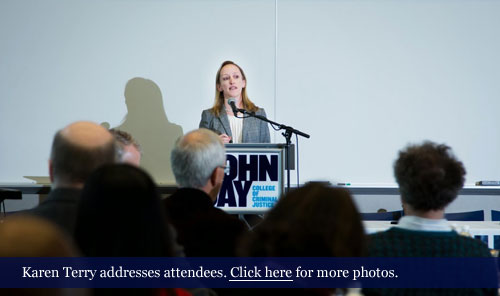Newsroom Archive
The New York City Police Department has received considerable public attention for its use of stop, question and frisk (SQF) tactics, which proponents claim is responsible for much or all of New York City’s ongoing crime decline. Few studies, however, have examined the validity of that claim.
To get the latest on a complicated issue, many of the nation’s leading crime researchers gathered February 18 at John Jay College of Criminal Justice for the symposium “Does Stop, Question and Frisk Reduce Crime? Results from New Research.” Organized by Professor Karen Terry of John Jay’s Department of Criminal Justice and Professor Preeti Chauhan of the Department of Psychology, the symposium was supported by funding from the Open Society Foundations.
“The existing research reaches conflicting conclusions,” Professor Terry observed. “That research is limited in several ways, including the use of geographic units of analysis that may be too large and heterogeneous to detect meaningful differences.”
New research, the results of which were presented at the symposium, remedies this problem by analyzing the impact on crime of monthly changes in SQF at the level of census tracts, block groups and street segments. Results of the research shed new light on a hotly debated issue that affects New Yorkers as well as residents of other cities where similar policing strategies are employed.
The symposium built on a September 2011 conference at John Jay on understanding the crime decline in New York City. Click here www.jjay.cuny.edu/crimedecline for more information.
Among the participants in the symposium as presenters, panelists and discussants were: James Lynch, University of Maryland; Eric Baumer, Florida State University; David Weisburd, Alese Wooditch and Brian Lawton, George Mason University; Karen Terry, Preeti Chauhan, Jeremy Travis, Tanya Coke and Delores Jones Brown, John Jay College; Richard Rosenfeld, University of Missouri–St. Louis; Robert Fornango, F1 Analytics; Sarit Weisburd, University of Washington—Seattle; Sue-Ming Yang, National Chung Cheng University in Taiwan; Robert Apel, Rutgers University; Robin S. Engel, University of Cincinnati; David F. Greenberg, New York University; Steve Messner, University at Albany; and Tom Tyler, Yale University.
Click here for photos from the symposium.
 Inside JJC (Faculty & Staff)
Inside JJC (Faculty & Staff) Technology Services Status
Technology Services Status


